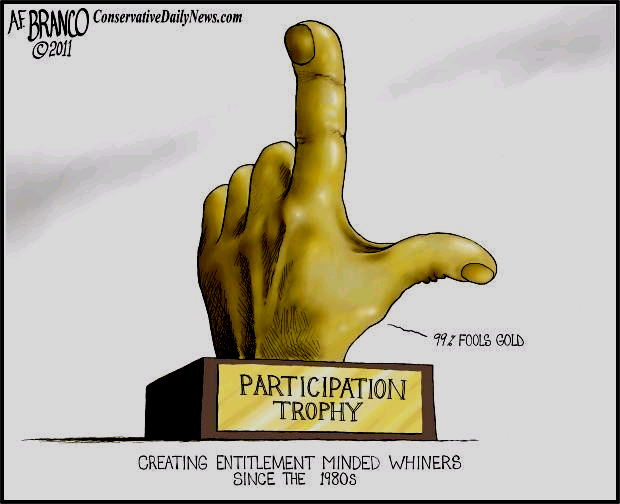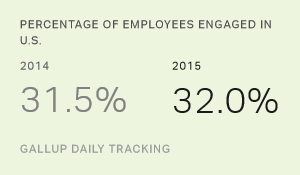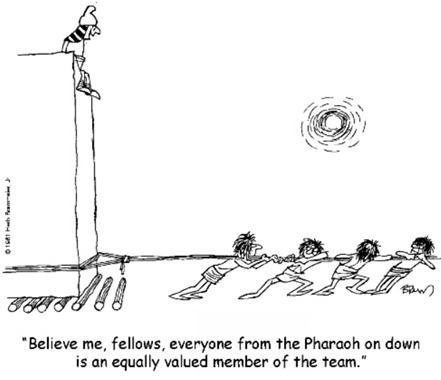Advocacy for Participation Trophies
It was the loving parents of Millennial babies who suction cupped ‘Baby on Board’ caution to car windows and manifested that same love when later they decided that all team members in youth sports deserved a trophy for participating.
Or, as so many members of us older generations like to put it, “Those kids even received trophies for just participating.”
As obvious as it is to us all that Millennials didn’t ask for the extra attention in the first instance is how obvious it is to me that they didn’t ask for the trophies either. I coached two girls soccer teams each year for seven years, following my daughter from six to thirteen, and three girls basketball teams, and never once did a girl ask for a trophy, for any reason.
So my intention here is to turn the tables and challenge us older generations on our views about participation; it has come to me that rather than denigrate it as just participation we should all place a much higher value on it.
I believe participation should be rewarded, enthusiastically.
Gallup regularly measures how engaged employees are in their work and the numbers condemn our leadership priorities and our management practices.
In 2015 Gallup found that only 32% of the over 80,000 workers they surveyed across the country were actively participating in their work; 68% weren’t attempting to do their best work nor were they interested in helping their companies improve and grow. This extraordinary finding is supported by a number of similar studies.
Besides coaching those girls teams I have one year as an assistant coach for the men’s soccer team at Knox College, my alma mater, and I have played on 18 organized teams; I played baseball from Little League through high school; I was on the high school swim team for three years; I played football in high school for three years and part of a college season; I played soccer for four years in college.
And I learned, we all learned, and everyone who pays attention to how their team can better perform learns that the participation of each team member is vital to the team’s success.
Participation is vital.
I was mostly an assistant coach for those girls soccer teams, and my self-appointed job was to make sure that each girl on the team knew how important her individual participation was. I spent time before, during, and after every practice making that message clear, collectively in team huddles and spending extra time with the girls who weren’t likely to play much or who were sacrificing their best position to play where the team needed them, to let them know that the harder they worked, the more of their talent and enthusiasm they gave, the better they would get but also the better the best players and the team would get as well.
And in virtually all cases the girls understood, embraced the challenge, and did the best they could to help the team get better.
Don’t you think that when that happens, when everyone is participating in a team’s journey towards high performance and success, that it should be celebrated?
I want to reward it, because we get more of the behavior we reward. And imagine the great lift to the economy when more than 32% of us are participating in our work.
It’s certainly achievable. Over a ten year period, in the 80’s and the 90’s, I helped start and grow two companies, back to back. I never formally measured our employee participation but I monitored it constantly and I am confident it was close to 90% in both instances and I am confident any of the folks who worked there would agree with my estimate.
(Much of my certainty comes from my study of the research NASA sponsored that determined 98% of us are born with a creative genius.)
The first, Providence Journal Cellular, built and managed 24 local market cellular telephone companies under the name Cellular One; when I left PJC employed nearly 400 folks and averaged a 63% market share against much larger competitors, the established telephone company’s cellular ventures. The second, FGI, was a marketing services company; by the time I left it employed around 125 folks and had made INC magazine’s Fastest Growing 100 Companies two years in a row.
It was my duty as the senior executive for these companies to keep our folks fully engaged and I found it was simple when I focused on one message and two strategies.
The message was that everyone who comes to work with us has to accept two jobs. One is the job on their job description—cell site engineer or graphic designer. The other is to be on the lookout for ways to help us grow and improve the company, both things they could do on their own and others they could bring to senior leaders’ attention. The first job, I acknowledged, would be the greater investment in time but the second was as important to our success. And early on in the recruiting process I asked folks to share their responses to that idea, and to please not join us if they didn’t want to accept the second responsibility.
The first strategy was I never considered that an employee was successfully recruited; I believed in continually recruiting the folks who came to work for us. That special feeling you have about yourself when a company is recruiting you to a new adventure can and should be maintained. When I was recruiting before hiring I let folks know that I intended to continue recruiting after hiring by making sure they had the resources they needed to do their best work and that they were presented with opportunities that would challenge them, and that if they ever thought I wasn’t recruiting the best of them they would be doing me a favor by letting me know right away.
Second, I was determined to make sure everyone was fully aware of what was going on in the company. I couldn’t expect them to care about what was happening if they didn’t know. This takes on a special import perhaps with start-ups and early stage ventures where there better be radical changes happening if the start-up is to succeed. But I found that even as the companies matured a bit and change moderated some, the regular and frequent meetings that allowed folks to keep each other appraised were crucial. I used to think that when the only complaints I heard were that there were too many meetings, I was having just the right amount of meetings.
So no, don’t stop giving out participation trophies. Instead, reach out to the youth coaches you know and ask them how they handle this opportunity to provide all team members with the important messages and modeling that makes it clear that each member’s participation supports the team’s success. Then coach them up a bit if you find they need it.
And let’s consider the possibility that if you’ve been deriding Millennials because they were given participation trophies they never asked for, that might be evidence that you haven’t been intentionally cultivating creative, entrepreneurial, productive, generative participation from your employees in your organization.
Would you reward the 68% who aren’t participating to get them to participate?
I would.
(Note: Most of the research that measures the commitment employees bring to their employers use the word engagement. I feel comfortable conflating engagement with participation for our purposes here since I find the second most common definition for engage is “to participate or become involved in”, and a common synonym is “participate in” and so of course a common synonym for participate is “to engage in.”)






Michael LaRocca
May 7, 2017 at 10:32 pmI shared this partly because I’ve never seen anyone defend the Participation Trophy before. Let’s open the floor to debate.
It’s so ingrained in me to participate in whatever I’m doing to the best of my ability, by both nature and nurture, that I tend to forget some people phone it in. Given that, I can finally see the value of the participation trophy. But I think maybe the winners’ trophies should be better in some way. I wouldn’t have many of those, but I’d sure enjoy striving for them.
Carl Nordgren
June 30, 2017 at 3:53 pmThanks Michael. Great addition. I like the creative power of Both. Let’s always make sure that earned achievements are rewarded. And most organizations I have been a part of are also highly successful because of the full and true participation of the most of us. You da man, man.